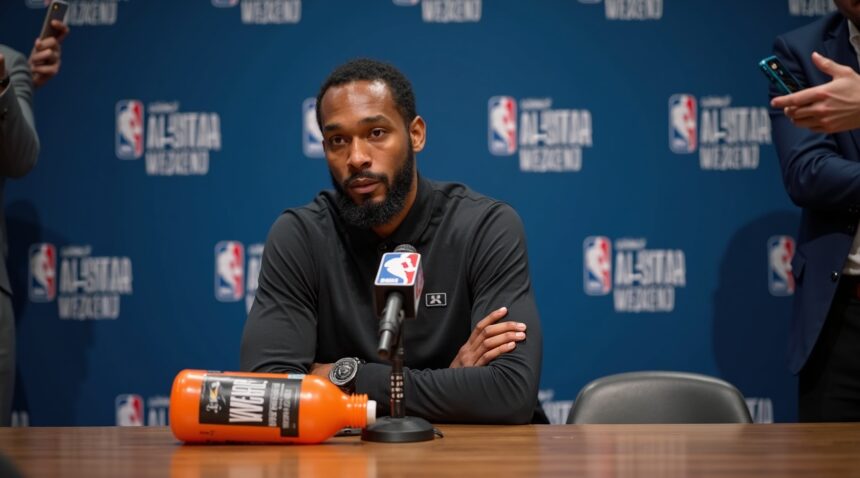NBA players are increasingly moving away from Gatorade, influenced by both endorsement incentives and growing concerns about health implications associated with traditional sports drinks.
Key Takeaways
- Contractual obligations with competing brands prevent many NBA players from associating with Gatorade, as exclusive endorsement deals with BodyArmor, Biosteel, and X2 Performance include clauses prohibiting promotion of rival products.
- Health and ingredient concerns drive players to cleaner alternatives, with athletes increasingly examining artificial colors, flavors, and high sugar content in traditional sports drinks.
- Strategic investment opportunities influence player choices, as many athletes prefer equity stakes in emerging brands over traditional endorsement deals. This trend follows examples like Kobe Bryant’s successful BodyArmor investment.
- Personalized hydration strategies have replaced one-size-fits-all approaches, with players working with nutritionists to develop custom routines that may include water, coconut water, or specialized protein shakes.
- Public brand activism allows players to shape narratives around youth nutrition and corporate responsibility, using their platforms to question major brands while promoting alternatives that align with their values.
Spotlight: Kawhi Leonard’s Statement
One vivid moment that epitomized this shift occurred during the 2021 All-Star MVP press conference, when Kawhi Leonard removed a Gatorade bottle from view and said, “kids don’t need to be drinking that.” This act went viral, serving as a firm statement on how NBA players are influential voices in shaping public discourse around health and corporate influence.
Kawhi Leonard’s Viral Gatorade Rejection That Sparked a Movement
The 2021 NBA All-Star weekend took an unexpected turn when Kawhi Leonard made a statement that reverberated throughout sports marketing circles. After claiming All-Star MVP honors, Leonard deliberately removed a Gatorade bottle from the press conference table and delivered a pointed message: “kids don’t need to be drinking that.” This spontaneous moment captured on camera transformed into a viral sensation within hours.
Social media platforms exploded with discussions about the incident, with fans and critics alike dissecting Leonard’s bold statement. The clip spread rapidly across Twitter, Instagram, and TikTok, generating millions of views and sparking debates about sports drinks and their nutritional value for young athletes. Leonard’s position as a respected NBA player and role model amplified the message’s impact, particularly among youth athletes who look up to him.
The timing of Leonard’s statement proved significant for his personal brand strategy. Shortly after the incident, news emerged that Leonard had become a shareholder in X2 Performance, a sports drink company focused on healthier hydration alternatives. This revelation demonstrated Leonard’s commitment to backing products that aligned with his public statements about youth nutrition and health.
Athletes Taking Control of Their Brand Narrative
Leonard’s action represents part of a larger trend among NBA stars who actively shape their endorsement portfolios rather than accepting traditional corporate partnerships. Players like Klay Thompson have also distanced themselves from Gatorade, despite maintaining contracts with competing beverage brands such as Built with Chocolate Milk and BodyArmor. These athletes recognize their influence extends far beyond basketball courts.
The strategic nature of these public gestures becomes evident when examining their settings and timing. Press conferences and post-game interviews provide maximum visibility for such statements, ensuring widespread media coverage and social media amplification. Players understand that their visible actions during these moments carry significant weight with fans and can spark broader conversations about corporate responsibility in sports marketing.
Celebrity role models like Leonard wield considerable influence over purchasing decisions, particularly among young consumers. When a respected athlete questions a major brand’s product publicly, it forces both the company and consumers to examine the product’s value proposition more critically. The relationship between companies and athletes has evolved into a more complex dynamic where players increasingly demand alignment between their personal values and their endorsement deals.
Leonard’s rejection of Gatorade demonstrates how modern athletes approach brand partnerships with greater scrutiny. Rather than simply accepting lucrative deals, players now consider the long-term implications of associating with certain products, especially when those products target younger demographics. This shift reflects a broader evolution in athlete activism and social responsibility.
The viral nature of Leonard’s statement highlighted the power of authentic moments in sports marketing. Unlike carefully crafted advertising campaigns, spontaneous gestures often resonate more deeply with audiences because they appear genuine and unscripted. Fans responded positively to Leonard’s willingness to prioritize health concerns over potential sponsorship opportunities.
The incident also showcased how quickly brand perceptions can shift in the digital age. Within hours of Leonard’s statement, discussions about Gatorade’s ingredients, sugar content, and marketing tactics dominated sports forums and social media platforms. This immediate scrutiny forced the company to defend its product positioning and nutritional claims more vigorously.
Leonard’s shareholding in X2 Performance represents a growing trend among athletes who prefer equity stakes in smaller companies over traditional endorsement deals with major corporations. This approach allows players to maintain greater control over their brand messaging while potentially generating higher long-term returns on their investments.
The incident established a precedent for other athletes who might be considering similar public statements about corporate partnerships. Leonard demonstrated that players can successfully challenge major brands without facing significant backlash from fans or the league, provided their actions align with genuine health and wellness concerns.
https://www.youtube.com/watch?v=bsOsxxG_GY8
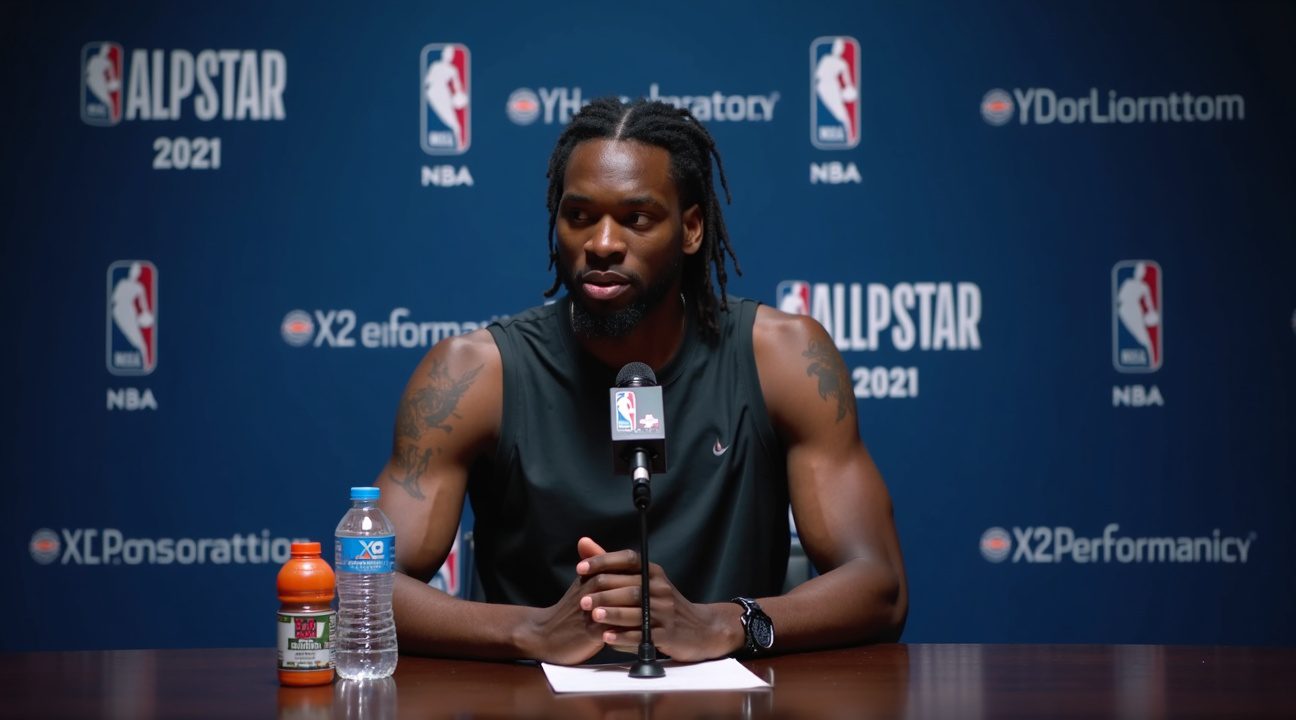
Multi-Million Dollar Contract Conflicts Drive Brand Loyalty
Professional basketball players carefully navigate endorsement relationships that can be worth millions, and these lucrative contracts often prevent them from associating with Gatorade. Athletes sign exclusive deals with competing sports drink brands, creating contractual obligations that go far beyond simple preferences.
Strategic Investment Moves Shape Brand Allegiances
BodyArmor transformed the sports drink landscape when NBA legend Kobe Bryant invested in and actively promoted the brand. Bryant’s involvement wasn’t just a celebrity endorsement — he became a strategic partner who helped reshape how athletes view sports drink partnerships. His investment proved prescient, as BodyArmor’s valuation skyrocketed and eventually led to Coca-Cola’s acquisition of the brand for $5.6 billion.
Following Bryant’s lead, other high-profile athletes have aligned themselves with alternative brands through both endorsement deals and equity stakes. Kawhi Leonard partnered with X2 Performance, while other players have found opportunities with brands like Built with Chocolate Milk. These relationships represent more than traditional sponsorships — they’re business investments that can yield substantial returns.
Athletes understand that brand loyalty extends beyond wearing a logo or appearing in commercials. They actively protect their partners’ interests by avoiding any actions that might promote competing products. This explains why viewers often notice players covering or removing Gatorade logos during press conferences and interviews. Such deliberate actions demonstrate the serious financial stakes involved in sports drink partnerships.
The strategic nature of these relationships becomes evident when examining how athletes manage their brand relationships across different product categories. Players who partner with BodyArmor won’t risk diluting that relationship by being photographed with Gatorade products during public appearances.
Contract terms often include specific clauses about competitive products, requiring athletes to avoid any association with rival brands. These provisions protect the exclusivity that brands pay premium rates to secure. Players take these obligations seriously because violations can result in financial penalties or contract termination.
Investment opportunities have also influenced player decisions regarding sports drink partnerships. When athletes can secure equity stakes in emerging brands, they’re incentivized to help grow those companies rather than promote established competitors. This creates a win-win scenario where players benefit from both immediate endorsement payments and potential long-term equity appreciation.
The shift away from Gatorade reflects broader changes in how athletes approach brand partnerships. Rather than simply endorsing products for immediate payment, many players now seek strategic relationships that offer growth potential and business learning opportunities. These partnerships often include mentorship components where athletes gain insights into business operations and marketing strategies.
Financial considerations also play a role in determining which brands athletes choose to support. Emerging companies often offer more favorable terms and higher percentage deals compared to established giants who may have less flexibility in their contract structures. Players recognize that supporting smaller brands during their growth phases can lead to more substantial financial rewards than partnering with market leaders.
Media training now includes specific guidance on how athletes should handle situations involving competing brands. Players learn techniques for diplomatically avoiding acknowledgment of rival products while maintaining professional relationships with media and event organizers who may have different sponsorship arrangements.
The coverage removal phenomenon has become so common that fans now watch for these subtle brand protection moves during broadcasts. Athletes have developed creative methods for handling competitive products, from strategically placed towels to quick logo repositioning, all designed to honor their contractual obligations while avoiding awkward confrontations.
Personal investment strategies continue driving these brand loyalty decisions as athletes seek to diversify their income streams beyond traditional salary and endorsement structures. Smart players recognize that equity participation in growing companies can provide financial security that extends well beyond their playing careers, making these strategic partnerships increasingly attractive compared to traditional endorsement deals with established brands.
https://www.youtube.com/watch?v=VYg279YHn1A
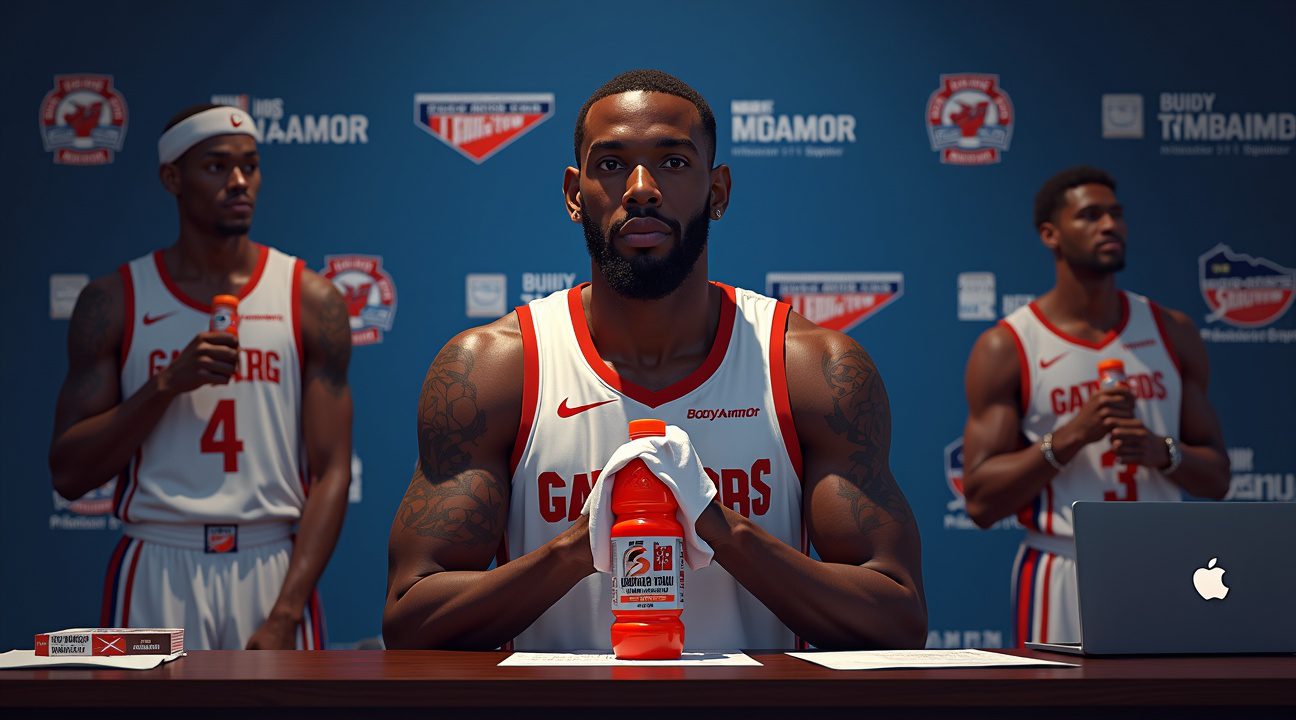
The Clean Ingredient Revolution Among NBA Stars
Professional basketball players increasingly scrutinize what they consume, leading many to distance themselves from traditional sports drinks like Gatorade. This shift reflects a broader movement within the NBA where athletes prioritize clean, natural ingredients over conventional formulations that have dominated the sports drink market for decades.
Natural Ingredients Drive Player Preferences
Kawhi Leonard exemplifies this trend through his partnership with X2 Performance, explicitly choosing the brand because of its commitment to clean, natural ingredients rather than the artificial colors and flavors found in traditional options. Leonard’s decision demonstrates how elite athletes now view ingredient quality as directly connected to their performance and long-term health goals.
BodyArmor has captured significant market share among NBA players precisely because it positions itself as a cleaner alternative. The brand utilizes coconut water as a base and incorporates fewer artificial components compared to traditional sports drinks. Players appreciate this approach because coconut water provides natural electrolytes without the need for synthetic additives.
Biosteel represents another popular choice among health-conscious NBA athletes. The company markets itself specifically on containing no artificial flavors or colors, appealing to players who want transparent ingredient lists. This clean-label approach resonates with athletes who understand that what they consume directly impacts their recovery and performance capabilities.
Performance and Nutrition Considerations
Athletes’ motivations for choosing alternative hydration options extend beyond simply avoiding artificial ingredients. They seek superior nutrition profiles that support their demanding training regimens and competitive schedules. These players recognize that their bodies function as high-performance machines requiring premium fuel.
Sugar content becomes a critical factor when comparing hydration options. Players often evaluate drinks based on their ability to provide sustained energy without causing blood sugar spikes that might affect performance. Natural sweeteners and lower overall sugar levels appeal to athletes who monitor their nutritional intake carefully.
The comparison between Gatorade, BodyArmor, and Biosteel frequently centers on ingredient transparency and nutritional benefits. While Gatorade maintains its market dominance through extensive athlete partnerships, younger players increasingly question whether traditional formulations align with modern understanding of sports nutrition.
Recovery enhancement drives many of these beverage choices. Players believe that natural hydration sources provide better recovery benefits compared to drinks containing artificial additives. This perspective influences purchasing decisions as athletes invest in products they believe will extend their careers and optimize their performance.
Clean label drinks have gained momentum because they offer ingredients that players can easily identify and understand. Transparency becomes paramount when athletes must trust that everything they consume supports their professional goals rather than potentially hindering them.
Some players also consider the potential long-term health implications of consuming artificial ingredients regularly. Professional athletes consume sports drinks in quantities far exceeding typical consumers, making ingredient quality even more significant for their overall health and wellness.
The trend reflects a generational shift in how athletes approach nutrition and supplementation. Younger players often arrive in the league already educated about clean eating principles and ingredient awareness, making them naturally inclined to question traditional sports drink formulations.
Brand partnerships sometimes complicate these preferences, as sponsorship agreements can influence which products players publicly endorse. However, many athletes now prioritize personal health goals over purely financial considerations when selecting beverages for training and competition.
This clean ingredient revolution among NBA stars continues gaining momentum as more players share information about alternative hydration options. Their influence extends beyond professional basketball, as fans and amateur athletes often emulate the choices made by their favorite players, creating broader market demand for cleaner sports drink formulations.
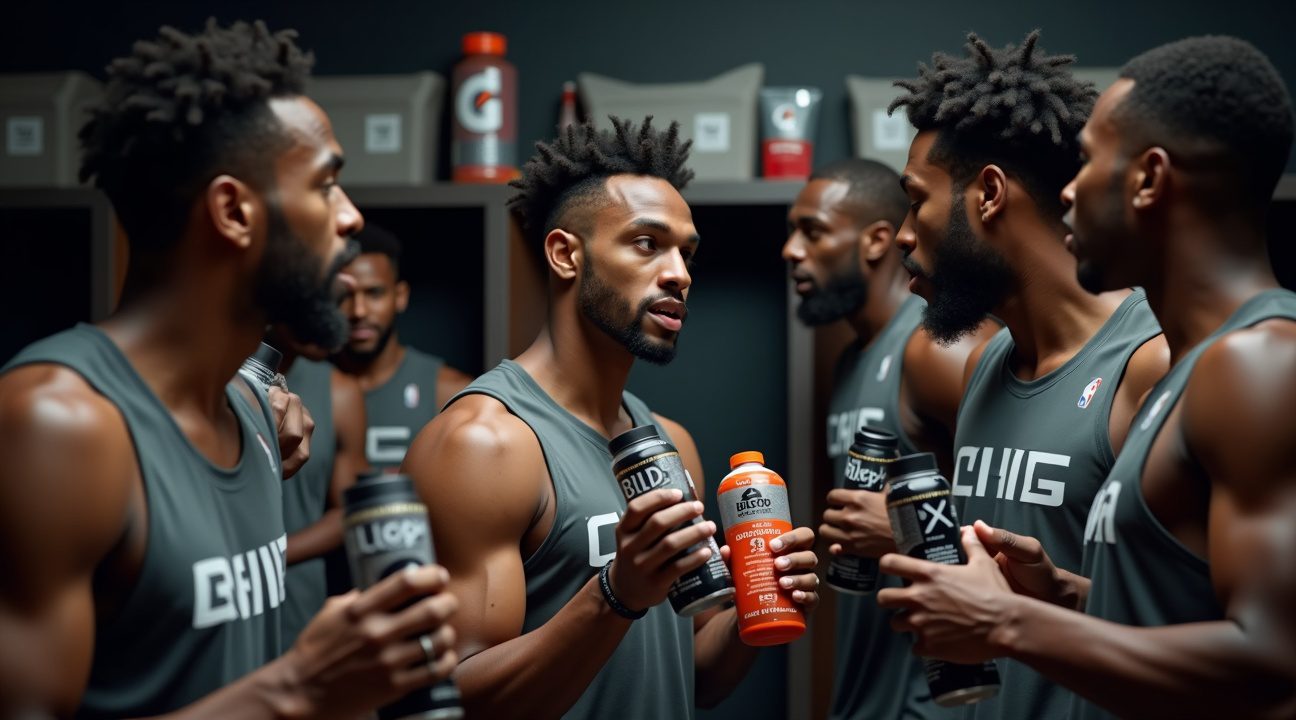
NBA Players Embrace Diverse Hydration Options Beyond Traditional Sports Drinks
Today’s NBA athletes aren’t limiting themselves to traditional sports drinks like Gatorade when it comes to staying hydrated. The landscape has shifted dramatically as players discover alternatives that better align with their personal health philosophies and performance goals.
The Rise of Natural and Alternative Hydration
Plain water remains the foundation for many professional players, with good reason. A 2018 sports nutrition study revealed that 64.5% of amateur basketball players preferred water for hydration before, during, and after games, while only 6% chose energy drinks. This preference extends into the professional ranks, where players recognize that simple hydration often proves most effective.
Coconut water has gained significant traction among NBA stars for its natural potassium content and superior hydration properties. Players appreciate that it delivers essential electrolytes without artificial ingredients or excessive sugar. Natural alternatives like Biosteel and BodyArmor have also carved out space in locker rooms across the league, offering cleaner ingredient profiles than conventional sports drinks.
Some athletes have moved toward personalized protein shakes that combine hydration with recovery benefits. These custom blends allow players to address multiple nutritional needs simultaneously, maximizing their time and ensuring optimal performance preparation.
Personalized Hydration Strategies
Elite players increasingly work with nutritionists to develop custom hydration routines that match their specific physiological needs. These personalized approaches consider factors like sweat rate, electrolyte loss patterns, and individual digestive sensitivities. Rather than following a one-size-fits-all approach, players now fine-tune their hydration strategies just as carefully as they develop their shooting mechanics.
The growing emphasis on personalization reflects a broader trend in professional sports nutrition. Players recognize that what works for one athlete may not be optimal for another. Some prefer the simplicity of water, while others benefit from specific electrolyte combinations found in specialized products.
This shift also connects to broader conversations about athlete autonomy and brand partnerships. The partnership between Nike and Kyrie Irving suspended situation demonstrated how athletes’ personal choices can impact their commercial relationships. Similarly, hydration preferences sometimes reflect players’ desire to maintain control over what they put in their bodies, regardless of league sponsorship deals.
Smart recovery protocols now integrate hydration timing with sleep optimization and muscle recovery. Players consume specific beverages at calculated intervals to support their body’s natural repair processes. This scientific approach represents a major evolution from simply grabbing whatever sports drink was available.
The influence of Nike and Adidas companies relations with athletes extends beyond footwear and apparel into nutrition partnerships. Players increasingly seek brands that align with their personal values and performance philosophies, leading to more diverse options in professional sports.
Modern NBA athletes understand that hydration choices impact everything from energy levels to cognitive function during games. They’re moving away from sugar-heavy options that might provide quick energy but lead to crashes later. Instead, many opt for steady, sustained hydration that supports consistent performance throughout long seasons.
Recovery-focused hydration has become particularly important as players extend their careers into their late thirties and beyond. Veterans often pioneer new approaches that younger players eventually adopt, creating ripple effects throughout the league.
The availability of detailed performance data now allows players to track how different hydration strategies affect their on-court metrics. This data-driven approach helps athletes make informed decisions about which products truly enhance their performance versus those that simply claim to do so.
Professional sports nutrition continues evolving as players gain access to better information and more choices. What seemed revolutionary five years ago now represents standard practice, while entirely new approaches emerge regularly. This constant innovation ensures that NBA players will continue exploring alternatives that help them perform at their highest levels.
Gatorade Fights Back Against Growing Competition and Health Trends
The sports drink market has become increasingly competitive as athletes prioritize health-conscious choices over traditional formulations. Gatorade faces mounting pressure from both emerging brands and high-profile athletes who’re advocating for cleaner alternatives to conventional sports drinks.
Product Innovation in Response to Health Demands
Recognizing the shift in consumer preferences, Gatorade has launched several lower-sugar and cleaner-label product lines. The company’s G2 series reduces sugar content by half while maintaining electrolyte benefits, and Gatorade Fit targets health-conscious consumers with no added sugar and organic ingredients. These innovations demonstrate Gatorade’s commitment to adapting its traditional formula to meet modern nutritional standards.
The brand has also introduced Gatorlyte, a rapid rehydration formula with five electrolytes and lower sodium content than classic Gatorade. This product directly addresses criticism from athletes who’ve expressed concerns about excessive sugar and artificial ingredients in traditional sports drinks.
Strategic Endorsements and Market Position
Despite some high-profile rejections from NBA players who’ve chosen alternative brands, Gatorade maintains strategic partnerships with major basketball stars. The company’s endorsement portfolio includes several key NBA players:
- Michael Jordan continues his legendary association with the brand through the Jordan sub-brand
- Luka Doncic represents the new generation of Gatorade ambassadors
- Jayson Tatum serves as a prominent face for current marketing campaigns
- Zion Williamson brings additional star power to Gatorade’s roster
These partnerships help counter negative publicity from athletes who’ve distanced themselves from the brand. While some players have publicly criticized Gatorade’s ingredients or chosen competitors like BodyArmor or Biosteel, the company’s ability to secure top-tier talent demonstrates its ongoing appeal.
The competitive landscape has intensified with BodyArmor gaining significant market share through celebrity endorsements and marketing campaigns emphasizing natural ingredients. Biosteel has similarly attracted athletes by promoting plant-based formulations without artificial colors or flavors. These challenges force Gatorade to continuously evaluate its product offerings and marketing strategies.
Gatorade’s response strategy extends beyond product reformulation to include enhanced research and development efforts. The company invests heavily in sports science research to validate its products’ effectiveness and develop new formulations that address specific athletic performance needs. This scientific approach helps differentiate Gatorade from smaller competitors who may lack extensive research backing.
The brand’s official partnership with the NBA provides significant distribution advantages and visibility that competitors struggle to match. Every NBA arena features Gatorade products, and the association creates automatic credibility with basketball players and fans. This institutional support helps offset individual athlete defections and maintains brand presence across professional basketball.
Market data shows Gatorade still commands the largest share of the sports drink category, though that dominance faces ongoing threats. The company’s ability to innovate while leveraging its established partnerships will determine whether it can maintain its leadership position. Athletes’ relationships with brands continue evolving as players become more selective about their endorsement choices.
Looking ahead, Gatorade’s success depends on balancing tradition with transformation. The brand must continue developing products that meet contemporary health standards while preserving the performance benefits that originally made it the preferred choice of professional athletes. This balancing act requires ongoing investment in research, product development, and strategic partnerships that resonate with both current and future NBA stars.
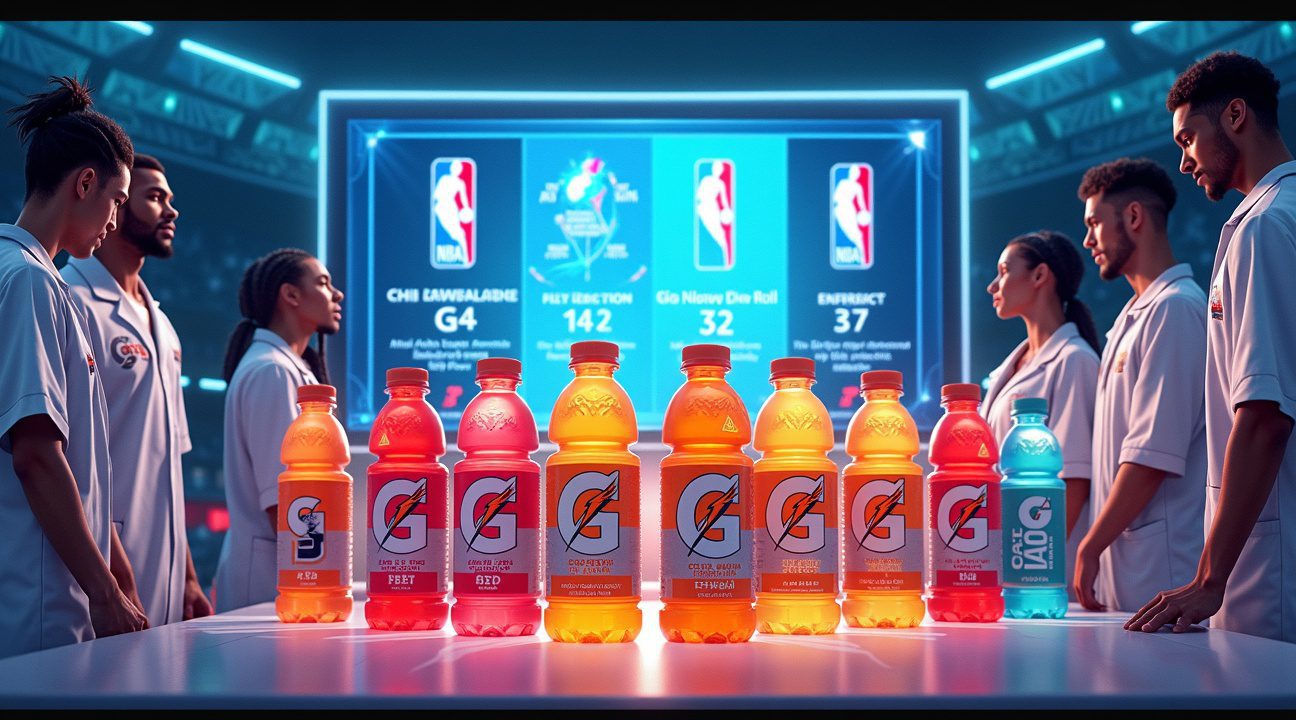
Sources:
EssentiallySports – Why Do NBA Players Hate Gatorade? Inside Kawhi Leonard, Klay Thompson and Other Stars’ Disgust for $19 Billion Brand
Redalyc – Hydration Habits Basketball

